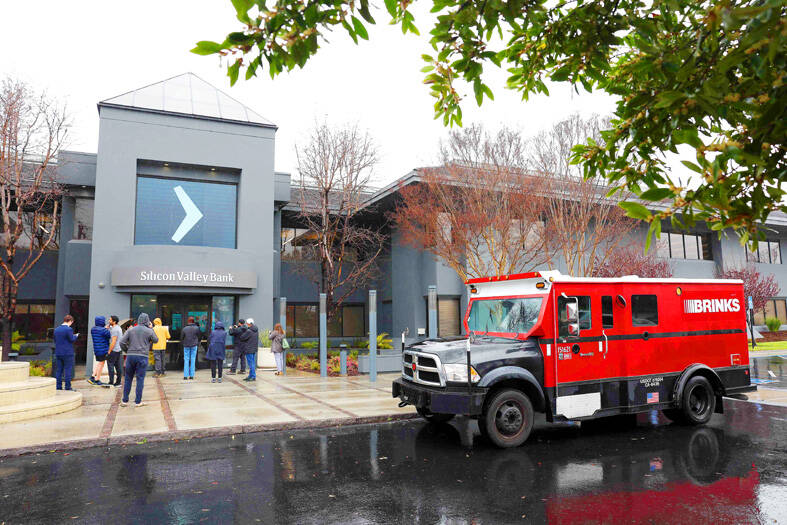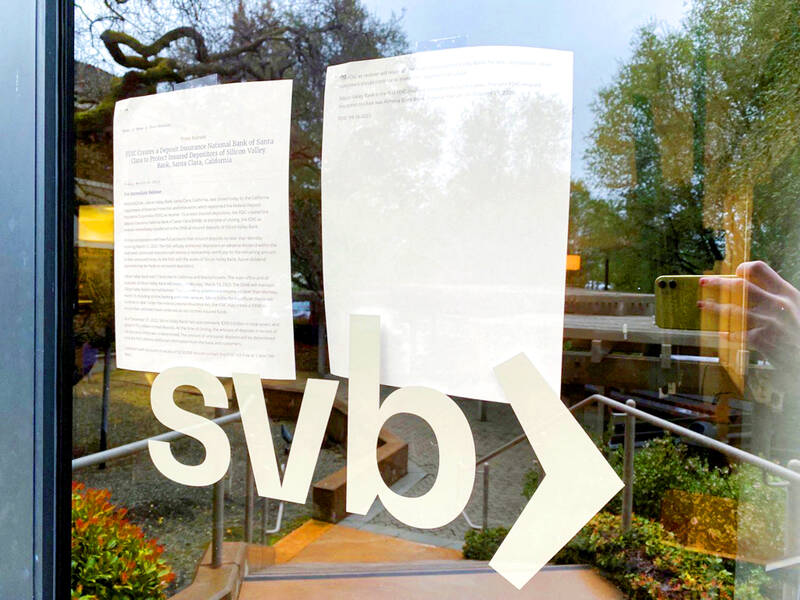US regulators on Friday rushed to seize the assets of one of Silicon Valley’s top banks, marking the largest failure of a US financial institution since the height of the financial crisis almost 15 years ago.
Silicon Valley Bank (SVB), the nation’s 16th-largest bank, failed after depositors hurried to withdraw money this week amid anxiety over the bank’s health. It was the second-biggest bank failure in US history after the collapse of Washington Mutual in 2008.
The bank served mostly technology workers and venture capital-backed companies, including some of the industry’s best-known brands.

Photo: AFP
“This is an extinction-level event for start-ups,” said Garry Tan (陳嘉興), CEO of Y Combinator, a start-up incubator that launched Airbnb, DoorDash and Dropbox, and has referred hundreds of entrepreneurs to the bank.
“I literally have been hearing from hundreds of our founders asking for help on how they can get through this,” Tan said. “They are asking: ‘Do I have to furlough my workers?’”
There appeared to be little chance of the chaos spreading in the broader banking sector, as it did in the months leading up to the 2008 recession. The biggest banks — those most likely to cause an economic meltdown — have healthy balance sheets and plenty of capital.

Photo: Reuters
Nearly half of the US technology and healthcare companies that went public last year after receiving early funding from venture capital firms were Silicon Valley Bank customers, the bank’s Web site says.
Tan said that nearly one-third of Y Combinator’s start-ups would not be able to make payroll at some point in the next month if they cannot access their money.
Internet TV provider Roku was among casualties of the bank’s collapse.
It said in a regulatory filing on Friday that about 26 percent of its cash — US$487 million — was deposited at SVB, and the deposits were largely uninsured.
As part of the seizure, California bank regulators and the US Federal Deposit Insurance Corp (FDIC) transferred the bank’s assets to a newly created institution — the Deposit Insurance Bank of Santa Clara. The new bank is to start paying out insured deposits tomorrow.
The FDIC and California regulators plan to sell off the rest of the assets to make other depositors whole.
There was unease in the banking sector all week, with shares tumbling by double digits. Then news of SVB’s distress pushed shares of almost all financial institutions even lower on Friday.
The failure arrived with incredible speed.
Some industry analysts on Friday said the bank was still a good company and a wise investment, while SVB executives were trying to raise capital and find additional investors.
However, trading in the bank’s shares was halted before the stock market’s opening bell due to extreme volatility.
Shortly before noon, the FDIC moved to shutter the bank. Notably, the agency did not wait until the close of business, which is the typical approach. The FDIC could not immediately find a buyer for the bank’s assets, signaling how fast depositors cashed out.

CROSS-STRAIT TENSIONS: MOFA demanded Beijing stop its military intimidation and ‘irrational behavior’ that endanger peace and stability in the Indo-Pacific region The Presidential Office yesterday called on China to stop all “provocative acts,” saying ongoing Chinese military activity in the nearby waters of Taiwan was a “blatant disruption” of the “status quo” of security and stability in the Indo-Pacific region. Defense officials said they have detected Chinese ships since Monday, both off Taiwan and farther out along the first island chain. They described the formations as two walls designed to demonstrate that the waters belong to China. The Ministry of National Defense yesterday said it had detected 53 military aircraft operating around the nation over the past 24 hours, as well

‘LAGGING BEHIND’: The NATO secretary-general called on democratic allies to be ‘clear-eyed’ about Beijing’s military buildup, urging them to boost military spending NATO Secretary-General Mark Rutte mentioning China’s bullying of Taiwan and its ambition to reshape the global order has significance during a time when authoritarian states are continuously increasing their aggression, the Ministry of Foreign Affairs (MOFA) said yesterday. In a speech at the Carnegie Europe think tank in Brussels on Thursday, Rutte said Beijing is bullying Taiwan and would start to “nibble” at Taiwan if Russia benefits from a post-invasion peace deal with Ukraine. He called on democratic allies to boost defense investments and also urged NATO members to increase defense spending in the face of growing military threats from Russia

LEAP FORWARD: The new tanks are ‘decades more advanced than’ the army’s current fleet and would enable it to compete with China’s tanks, a source said A shipment of 38 US-made M1A2T Abrams tanks — part of a military procurement package from the US — arrived at the Port of Taipei early yesterday. The vehicles are the first batch of 108 tanks and other items that then-US president Donald Trump announced for Taiwan in 2019. The Ministry of National Defense at the time allocated NT$40.5 billion (US$1.25 billion) for the purchase. To accommodate the arrival of the tanks, the port suspended the use of all terminals and storage area machinery from 6pm last night until 7am this morning. The tanks are expected to be deployed at the army’s training

FORUM QUARREL: China’s TAO took unfriendly action against Taiwan with its ‘22 guidelines’ against ‘independence diehards’ and reporting system, the council said The government’s denial of permits for Shanghai Municipal Taiwan Affairs Office (TAO) Director Jin Mei (金梅) and nine Chinese journalists to attend the Twin-City Forum in Taipei next week were to protest against and express disapproval of China’s 22-point set of “guidelines” to penalize “diehard” Taiwanese independence separatists, the Mainland Affairs Council (MAC) said yesterday. Beijing on June 21 unveiled the “22 guidelines” that allow its courts to try “Taiwan independence separatists” in absentia, with the death sentence applicable. The government must review permit applications based on the cross-strait situation, the MAC said. China’s Taiwan Affairs Office took unfriendly action against Taiwan